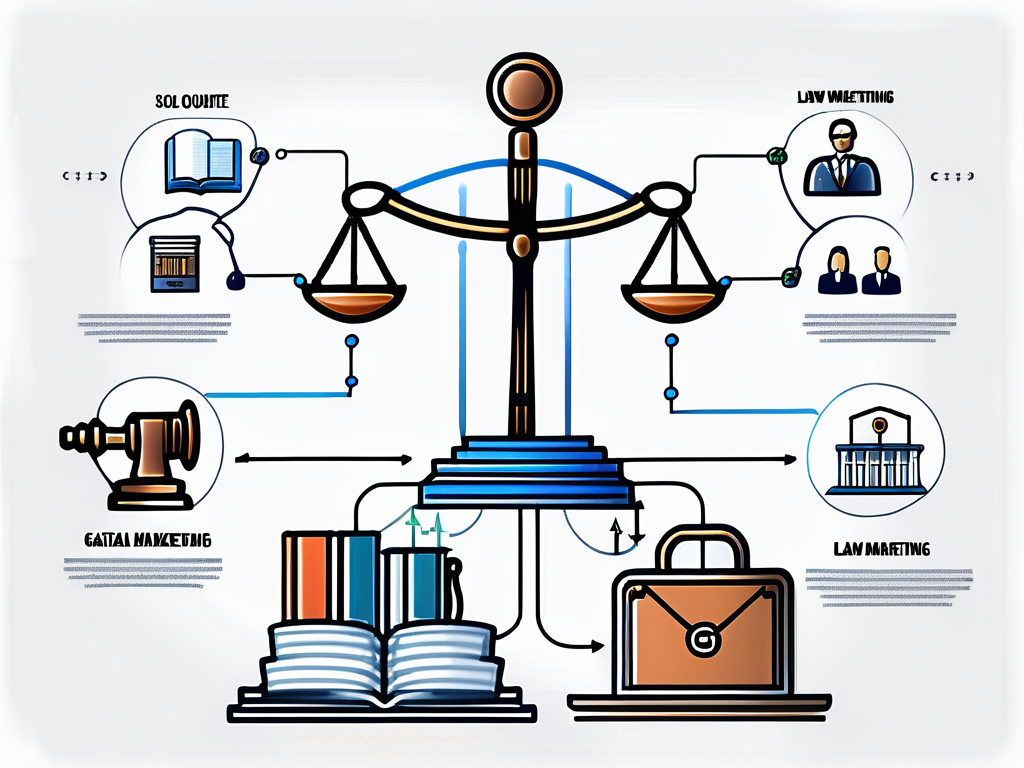Digital marketing has become an essential tool for legal professionals who want to stay competitive in today’s rapidly evolving landscape. With the increasing reliance on technology, it is crucial to understand the strategies that can help law firms thrive in the digital era.
In this guide, we will break down the key elements of digital marketing and provide actionable tips to help legal professionals navigate this exciting new frontier.
Decoding Digital Marketing Strategies for Legal Professionals
At the heart of any successful digital marketing campaign is a clear and achievable set of goals. For law firms, these goals should align with their overall business objectives and target audience. By setting specific and measurable goals, legal professionals can track their progress and make data-driven decisions that lead to success.

Understanding your target audience is vital in crafting effective marketing strategies. Law firms cannot afford to cast a net too wide in their marketing efforts. Instead, they must identify the key demographics and personas that are most likely to require their services. By tailoring their messages to these specific groups, legal professionals can increase the effectiveness of their marketing campaigns and connect with potential clients.
Building a website that converts is another crucial component of a successful digital marketing strategy for law firms. A well-designed website with clear navigation, informative content, and compelling calls-to-action can attract and engage prospective clients. It is essential to include key elements such as contact information, practice areas, testimonials, and case results to build trust and credibility.
Search engine optimisation (SEO) is a fundamental aspect of digital marketing for law firms. By optimising their websites and content for search engines, legal professionals can increase their online visibility and attract organic traffic. Effective SEO includes keyword research, on-page optimisation, link building, and technical optimisation to improve rankings and drive targeted traffic to the website.
Pay per click (PPC) advertising offers law firms a way to maximise results and attract potential clients through targeted online ads. By leveraging platforms like Google Ads, legal professionals can bid on relevant keywords and appear in search results and display networks. PPC advertising offers instant visibility and allows law firms to reach their target audience effectively.
Content marketing has emerged as a powerful tool for legal professionals in the digital age. By creating valuable and informative content, law firms can establish themselves as thought leaders in their respective practice areas. Content marketing includes blog posts, articles, videos, whitepapers, and other forms of content that provide value to potential clients and position the firm as a trusted source of information.
Social media platforms offer law firms an opportunity to engage with their target audience and build brand awareness. By creating compelling social media content and leveraging platforms like Facebook, Twitter, LinkedIn, and Instagram, legal professionals can connect with potential clients and establish a strong online presence.
Establishing a strong backlink profile is essential for law firms looking to enhance their online visibility. Backlinks, also known as inbound links, are links from external websites that direct users to a law firm’s website. By earning high-quality backlinks from authoritative websites, legal professionals can improve their organic search rankings and drive more targeted traffic.
Email marketing is an effective way for law firms to engage with their existing clients and nurture relationships. Crafting compelling email campaigns that provide valuable insights, updates, and offers can keep clients engaged and encourage repeat business. It is essential to segment the email list and tailor the content to specific client groups for maximum impact.
Client reviews play a crucial role in the success of a law firm’s digital marketing efforts. Positive reviews not only build trust and credibility but can also improve organic search rankings. Encouraging clients to leave reviews on platforms like Google My Business can help legal professionals attract new clients and differentiate themselves from their competitors.
Building credibility and trust is vital for law firms operating in the digital realm. By showcasing success stories, certifications, awards, and testimonials, legal professionals can establish themselves as trustworthy experts in their respective practice areas. Building a strong online reputation is crucial in attracting and retaining clients.
Voice search is another emerging trend that law firms should consider when developing their digital marketing strategies. With the rise of virtual assistants like Siri, Alexa, and Google Assistant, more and more people are using voice commands to search for information. Law firms can optimise their website content to be voice search-friendly by incorporating natural language and long-tail keywords. By doing so, they can increase their chances of appearing in voice search results and reaching potential clients who prefer this convenient and hands-free method of obtaining information.
By embracing these innovative platforms and technologies, law firms can stay ahead of the competition and effectively reach their target audience. However, it’s important to remember that while technology is a powerful tool, it should always be used in conjunction with a strong focus on providing exceptional service and building meaningful relationships with clients.
Understanding ROI in Attorney Internet Marketing
Return on investment (ROI) is a crucial metric for evaluating the success of digital marketing campaigns. By tracking the performance of different marketing channels, law firms can determine which strategies are generating the highest returns. It is essential to set specific goals and track metrics such as website traffic, conversion rates, cost per lead, and client acquisition cost to measure the effectiveness of digital marketing efforts.

Steering Clear of Common Pitfalls in Lawyer Marketing
While digital marketing offers numerous benefits to law firms, it is essential to avoid common pitfalls that can hinder success. One common mistake is failing to understand the needs and preferences of the target audience, which can result in ineffective marketing campaigns. Another pitfall is neglecting to track and analyse data, which can lead to missed opportunities and wasted resources. By staying informed and adapting to the evolving digital landscape, law firms can avoid these pitfalls and achieve digital marketing success.
One crucial aspect of effective lawyer marketing is understanding the needs and expectations of clients. By conducting thorough research and actively listening to client feedback, law firms can tailor their marketing strategies to address client pain points and provide solutions. Understanding client needs is an ongoing process that requires regular communication and continuous improvement.
Digital marketing strategies play a vital role in the success of law firms in today’s digital age. By decoding the key elements of digital marketing, setting clear goals, understanding the target audience, and implementing effective strategies, legal professionals can thrive online.
—
Rapid Growth Marketing is a dedicated marketing agency for lawyers specialising in SEO, Google Ads and professional websites. Our team has managed over 1000 successful SEO campaigns and survived and thrived through all the regular Google algorithm updates. If you would you like more traffic, enquiries & new clients for your law firm, let’s have a 30 minute call to discuss your needs.

